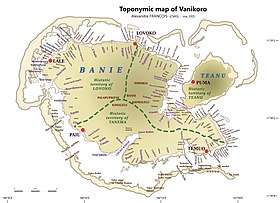Lovono language
Lovono (Vano, Alavano, Alavana) is a nearly extinct language of the island of Vanikoro in the easternmost province of the Solomon Islands. As of 2012, it is only spoken by four speakers;[1] it has been replaced by the island’s dominant language, Teanu.
| Lovono | |
|---|---|
| Alavana | |
| Native to | Solomon Islands |
| Region | Vanikoro |
Native speakers | 4 (2012)[1] |
| Language codes | |
| ISO 639-3 | vnk |
| Glottolog | vano1237[2] |
Name
The language name makes reference to an ancient village in the northwest of the island Banie.[4] In the language Lovono, which was once the dominant one in that area, the village was called Alavana. In Teanu, which is now the only language spoken by the modern population, the same village is called Lovono. This language shift is reflected in the people’s preference to use the Teanu form (i.e. Lovono) both for the village name and for the ancient language that used to be associated with it.
The same village – and hence the language – has been also spelled Whanou or Vano in the scientific literature, possibly reflecting an older pronunciation of the word.
The language
Some information on Lovono, as well as on the other languages of the island, can be found in François (2009).
Notes
- Homepage of the linguist A. François (LACITO-CNRS).
- Hammarström, Harald; Forkel, Robert; Haspelmath, Martin, eds. (2017). "Lovono". Glottolog 3.0. Jena, Germany: Max Planck Institute for the Science of Human History.
- Source: Maps of Vanikoro (languages, place names).
- François (2009).
References
- François, Alexandre (2009), "The languages of Vanikoro: Three lexicons and one grammar" (PDF), in Evans, Bethwyn (ed.), Discovering history through language: Papers in honour of Malcolm Ross, Pacific Linguistics 605, Canberra: Australian National University, pp. 103–126
External links
| Look up Category:Lovono lemmas in Wiktionary, the free dictionary. |
- Audio recordings in the Lovono language, in open access, by A. François (source: Pangloss Collection of CNRS).
